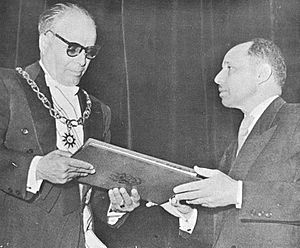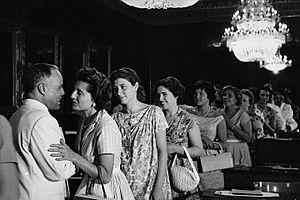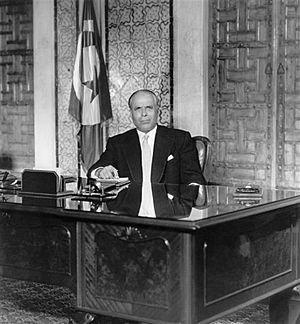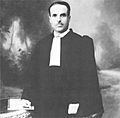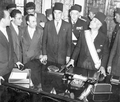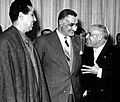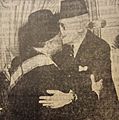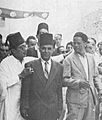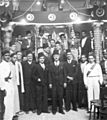Habib Bourguiba facts for kids
Quick facts for kids
Habib Bourguiba
|
|
|---|---|
|
الحبيب بورقيبة
|
|
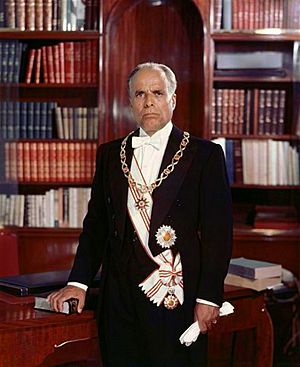
Habib Bourguiba in 1960
|
|
| President of Tunisia | |
| In office 25 July 1957 – 7 November 1987 Interim to 8 November 1959 |
|
| Prime Minister | Bahi Ladgham Hédi Nouira Mohammed Mzali Rachid Sfar Zine El Abidine Ben Ali |
| Preceded by | Office created (Muhammad VIII as King of Tunisia) |
| Succeeded by | Zine El Abidine Ben Ali |
| Prime Minister of Tunisia | |
| In office 11 April 1956 – 25 July 1957 |
|
| Monarch | King Muhammad VIII |
| Preceded by | Tahar Ben Ammar |
| Succeeded by | Bahi Ladgham (Indirectly) |
| Minister of Foreign Affairs | |
| In office 15 April 1956 – 29 July 1957 |
|
| Monarch | King Muhammad VIII |
| Preceded by | Office created |
| Succeeded by | Sadok Mokaddem |
| Minister of Defense | |
| In office 15 April 1956 – 29 July 1957 |
|
| Monarch | King Muhammad VIII |
| Preceded by | Office created |
| Succeeded by | Bahi Ladgham |
| Speaker of the National Constituent Assembly | |
| In office 9 April 1956 – 15 April 1956 |
|
| Monarch | King Muhammad VIII |
| Preceded by | First officeholder |
| Succeeded by | Jallouli Fares |
| Personal details | |
| Born |
Habib Ben Ali Bourguiba
3 August 1903 Monastir, French Tunisia |
| Died | 6 April 2000 (aged 96) Monastir, Tunisia |
| Resting place | Bourguiba mausoleum Monastir, Tunisia |
| Citizenship | Tunisian |
| Political party | Socialist Destourian Party (1964–1987) |
| Other political affiliations |
Neo Destour (1934–64) Destour (1930–34) |
| Spouses |
|
| Children | Jean Habib Bourguiba Hajer Bourguiba (adoptive) |
| Parents |
|
| Relatives | M'hamed Bourguiba (brother) Mahmoud Bourguiba (brother) Saïda Sassi (niece) |
| Alma mater | University of Paris |
| Occupation | Political activist |
| Profession | Lawyer |
| Signature | |
Habib Bourguiba (born August 3, 1903 – died April 6, 2000) was a Tunisian lawyer and leader. He guided Tunisia to become independent from France. He then served as the country's first prime minister from 1956 to 1957. After that, he became the first president of Tunisia, holding the office from 1957 to 1987. He was known as the "Supreme Combatant" for his efforts in gaining independence.
Contents
- Habib Bourguiba: Tunisia's First President
- Early Life and Education
- Starting a Political Career
- Fighting for Independence
- Leading Tunisia as Prime Minister
- Modernizing Tunisian Society
- Becoming President and Modernizing Tunisia
- Economic and Foreign Policies
- Later Years and Challenges
- Final Years and Legacy
- Bourguibism
- Social Reforms
- Foreign Policy
- One-Party State
- Personal Life
- Honours and Decorations
- Awards and Recognition
- Images for kids
- See also
Habib Bourguiba: Tunisia's First President
Early Life and Education
Habib Bourguiba was born in Monastir, Tunisia. He was the eighth child in his family. His father believed strongly in education for his children. Habib went to Sadiki College and then Lycée Carnot in Tunis.
He later studied at the University of Paris in France. He graduated in 1927 and became a lawyer in Tunis.
Starting a Political Career
In the early 1930s, Bourguiba became involved in politics. He joined the Destour party, which worked against colonial rule. In 1934, he helped create a new party called the Neo Destour. This party became very important in the fight for independence.
Bourguiba became a key leader in the independence movement. The French colonial government arrested him many times. He was even exiled to Marseille during World War II.
Fighting for Independence
After being released in 1945, Bourguiba went to Cairo, Egypt. He wanted to get support from the Arab League for Tunisia's independence. He returned to Tunisia in 1949 and became a major leader of the national movement.
At first, Bourguiba tried to negotiate peacefully with the French government. But when talks failed, he supported armed resistance starting in 1952. He was arrested and imprisoned for two years. Later, he was exiled to France.
In France, he led talks with Prime Minister Pierre Mendès France. They reached agreements for Tunisia to have internal self-rule. This meant Tunisia would manage its own affairs, but France would still control foreign policy and defense.
Bourguiba returned to Tunis in triumph on June 1, 1955. However, he faced challenges from Salah Ben Youssef, another leader in his party. Ben Youssef wanted full independence right away, not a step-by-step approach. This led to a conflict within the party. Bourguiba's approach, which favored gradual steps and modern ideas, won out.
Leading Tunisia as Prime Minister
Tunisia gained full independence in 1956. King Muhammad VIII al-Amin appointed Bourguiba as prime minister on April 11, 1956. Bourguiba quickly became the country's main leader.
As prime minister, Bourguiba worked to secure complete independence. He took control of the police and created the National Guard. He also reorganized Tunisia's government into 14 regions called governorates.
He started negotiations with France to gain full control over diplomacy and defense. Tunisia became an official member of the United Nations on November 12, 1956. He also founded the Tunisian Armed Forces in June 1956.
Modernizing Tunisian Society
Bourguiba began many important reforms to modernize Tunisia. He wanted to change old ways of thinking.
- On May 31, 1956, he ended special privileges for royal family members.
- He reformed the education system, making schools public and free. He also created Ez-Zitouna University for Islamic studies under government control.
- He strongly supported gender equality. He encouraged universal education for girls and women's access to jobs.
- On August 13, 1956, he enacted the Code of Personal Status. This major law changed family rules. It replaced traditional divorce with a legal process and required women's consent for marriage. It also banned polygamy (a man having multiple wives).
- He reformed the justice system, replacing religious courts with government courts.
Becoming President and Modernizing Tunisia
On July 25, 1957, the Republic of Tunisia was proclaimed. This ended the 252-year-old monarchy. Bourguiba was named the acting President of Tunisia. His role as prime minister was abolished.
In 1958, the French army bombed a border village called Sakiet Sidi Youssef. This led Bourguiba to demand that France leave Tunisia completely. After more negotiations and a crisis in Bizerte, French forces left Tunisia by October 15, 1963.
On June 1, 1959, Tunisia's new constitution was adopted. President Bourguiba signed it.
He continued to prioritize education and health. He appointed Mahmoud Messadi as his minister of education. Schools became public and free, and teachers were trained.
Bourguiba also challenged traditional customs. In 1961, he encouraged people not to fast during Ramadan to focus on development. He even drank orange juice on television during the day in 1964 to make his point.
In 1962, a plot to overthrow and assassinate Bourguiba was discovered. Several people were arrested and tried.
Economic and Foreign Policies
In the 1960s, Bourguiba supported a socialist economic policy. He aimed to develop the economy and improve living standards. He nationalized foreign-owned agricultural lands in 1964. His party, the Neo-Destour, was renamed the Socialist Destourian Party (SDP) in 1964.
In foreign policy, Bourguiba took a different path from other Arab leaders. He suggested normalizing relations with Israel in 1965. He also broke ties with the Arab League for a time. He was a strong supporter of Francophonie, promoting the French language and culture in Tunisia.
Later Years and Challenges
In the 1970s, Bourguiba faced health problems. He delegated some of his powers to Prime Minister Hedi Nouira. In 1974, he briefly considered a union between Libya and Tunisia, but this project was abandoned due to opposition.
On March 18, 1975, the National Assembly made Habib Bourguiba "president for life." This meant he would remain president until he died or chose to step down.
Economically, Tunisia moved towards a more liberal policy under Nouira. However, there were social tensions. On January 26, 1978, a general strike led to riots in Tunis. Many people were killed or injured. Bourguiba declared a state of emergency.
The 1980s brought more challenges. Bourguiba's health declined, and his behavior became unpredictable. This led to a struggle for power among those around him.
In late 1983, the government ended food subsidies, causing bread prices to rise. This led to the Tunisian bread riots in January 1984, where many protesters were killed. Bourguiba reversed the price increase.
In 1985, Israel attacked the Palestine Liberation Organization headquarters near Tunis. Tunisia's military could not stop the attack. This led Bourguiba to reduce relations with the United States.
As his health worsened, Bourguiba made more erratic decisions. On November 7, 1987, his prime minister, Zine El Abidine Ben Ali, removed him from power. Doctors declared Bourguiba mentally unable to perform his duties. Ben Ali then became president.
Final Years and Legacy
After being removed from power, Bourguiba was kept under house arrest in Monastir. He received medical care and was sometimes visited by President Ben Ali.
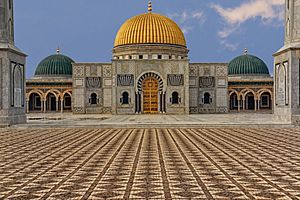
Habib Bourguiba died on April 6, 2000, at the age of 96. President Ben Ali declared seven days of national mourning. Many international leaders paid tribute to him.
Bourguiba led Tunisia to independence and founded its second republic. He is remembered for his efforts to modernize the country, especially in education and women's rights. His reforms aimed to transform Tunisian society.
Bourguibism
Bourguiba developed his own political ideas, called "Bourguibism." This was a practical approach based on the belief that reason should guide decisions. It also included ideas of supporting the welfare of the people.
His doctrine was similar to Kemalism in Turkey. It focused on Tunisian national identity, liberalism, and a controlled version of Islam. A key part of Bourguibism was the "step-by-step policy." This meant taking actions based on what was possible, not just what was hoped for. This allowed him to make big changes and sometimes sudden shifts in policy.
Social Reforms
Bourguiba's government made many reforms. These included:
- Giving more rights to women.
- Creating a public education system.
- Introducing family planning.
- Building a modern healthcare system.
- Improving literacy.
- Reorganizing government and economy.
- Ending religious property endowments (Waqf).
- Building new infrastructure.
His most important social reform was the Code of Personal Status (CPS) in 1956. This law gave women more rights, banned polygamy, and made divorce legal. It also raised the age at which girls could marry to 17. These changes were very modern for the time.
Bourguiba was critical of the veil, calling it "that odious rag" on several occasions. He believed in reforming society "within Islam," not against it.
Education was a top priority. The government's spending on education increased significantly. In 1958, Arabic teaching was unified into a bilingual system. He also started building universities and specialized institutes.
Foreign Policy
Bourguiba's foreign policy was unique. He maintained relations with France even after independence. He also built strong ties with the United States. Unlike some other Arab leaders, he did not see non-alignment as being anti-American.
He was a strong supporter of Francophonie, promoting the French language and culture. He believed it helped Tunisia be a modern and open country.
One-Party State
Although Bourguiba spoke of independence and the maturity of the Tunisian people, he eventually decided that Tunisia was not ready for democracy or multiple political parties. He proclaimed himself president for life.
His party, the Neo Destour, became the only legal party in 1963. This meant that political democracy, as understood in Western countries, did not exist. Bourguiba himself once said, "The system? What system? I am the system."
During his time in power, he often removed allies who became rivals. This included Salah Ben Youssef and Mahmoud El Materi.
Towards the end of his rule, there was a struggle for who would succeed him. The rise of Islamism and corruption also marked this period.
Personal Life
In Paris, while studying, Habib Bourguiba met Mathilde Lorrain. Their only child, Habib Bourguiba Jr., was born in 1927. They married in Tunisia in 1927. Mathilde later became a Tunisian citizen and converted to Islam. They divorced in 1961.
On April 12, 1962, Bourguiba married Wassila Ben Ammar. They adopted a girl named Hajer. Wassila became more involved in politics as her husband's health declined. They divorced in 1986.
Honours and Decorations
Tunisian National Honours
 :
:
- Grand Master & Grand Collar of the Order of Independence (automatic upon taking presidential office)
- Grand Master & Grand Collar of the Order of the Republic (automatic upon taking presidential office)
- Grand Master & Grand Cordon of the National Order of Merit (automatic upon taking presidential office)
- Grand Cordon of Nichan Iftikar (1956)
Foreign Honours
 Denmark : Knight of the Order of the Elephant (1963)
Denmark : Knight of the Order of the Elephant (1963) Egypt : Collar of the Order of the Nile (1965)
Egypt : Collar of the Order of the Nile (1965) Ethiopia : Grand Cross of the Order of the Star of Ethiopia (1963)
Ethiopia : Grand Cross of the Order of the Star of Ethiopia (1963) Ghana : Companion of the Order of the Star of Ghana (1966)
Ghana : Companion of the Order of the Star of Ghana (1966) Netherlands : Knight Grand Cross of the Order of Orange-Nassau (1966)
Netherlands : Knight Grand Cross of the Order of Orange-Nassau (1966) Iran : Collar of the Order of Pahlavi (1969)
Iran : Collar of the Order of Pahlavi (1969) Italy : Knight Grand Cross with Collar of the Order of Merit of the Italian Republic (May 25, 1962)
Italy : Knight Grand Cross with Collar of the Order of Merit of the Italian Republic (May 25, 1962) Ivory Coast : Grand Cross of the National Order of the Ivory Coast (1966)
Ivory Coast : Grand Cross of the National Order of the Ivory Coast (1966) Jordan : Collar of the Order of Al-Hussein bin Ali (1973)
Jordan : Collar of the Order of Al-Hussein bin Ali (1973) KSA : Collar of the Order of Abdulaziz Al Saud (1975)
KSA : Collar of the Order of Abdulaziz Al Saud (1975) Liberia : Grand Croce of the Order of the Pioneers of Liberia (1966)
Liberia : Grand Croce of the Order of the Pioneers of Liberia (1966) Libya : Collar of the Order of Idris I
Libya : Collar of the Order of Idris I Malaysia : Honorary Grand Commander of the Order of the Defender of the Realm (1969)
Malaysia : Honorary Grand Commander of the Order of the Defender of the Realm (1969) Mauritania : Grand Cordon of the Order of National Merit of Mauritania (1966)
Mauritania : Grand Cordon of the Order of National Merit of Mauritania (1966) Morocco : Collar of the Order of Muhammad
Morocco : Collar of the Order of Muhammad Morocco : Grand Cordon of the Order of Ouissam Alaouite (1956)
Morocco : Grand Cordon of the Order of Ouissam Alaouite (1956) Niger : Grand Cross of the Order of the Niger (1966)
Niger : Grand Cross of the Order of the Niger (1966) Oman : Special Class of the Order of Oman (1973)
Oman : Special Class of the Order of Oman (1973) Senegal : Grand Cross of the National Order of the Lion (1966)
Senegal : Grand Cross of the National Order of the Lion (1966) Spain : Collar of the Order of Civil Merit (May 24, 1968)
Spain : Collar of the Order of Civil Merit (May 24, 1968) Spain : Knight of the Collar of the Order of Isabella the Catholic (November 16, 1983)
Spain : Knight of the Collar of the Order of Isabella the Catholic (November 16, 1983) Sweden : Knight of the Royal Order of the Seraphim (May 22, 1963)
Sweden : Knight of the Royal Order of the Seraphim (May 22, 1963) Turkey : Collar of the Order of the State of Republic of Turkey (1960)
Turkey : Collar of the Order of the State of Republic of Turkey (1960) United Arab Emirates : Collar of the Order of the Federation (1973)
United Arab Emirates : Collar of the Order of the Federation (1973) United Kingdom : Honorary Knight Grand Cross of the Order of the Bath (1980)
United Kingdom : Honorary Knight Grand Cross of the Order of the Bath (1980) Yugoslavia : Yugoslav Great Star (1965)
Yugoslavia : Yugoslav Great Star (1965)
Awards and Recognition
- Honorary Degree from Cheikh Anta Diop University
- Honorary Degree from Cairo University
- Honorary Degree from Lebanese University
- Nelson Mandela Supreme Fighter Prize
- Order of Independence
Images for kids
-
The Bourguibas and the Kennedys at the White House in 1961.
See also
 In Spanish: Habib Burguiba para niños
In Spanish: Habib Burguiba para niños
 | Delilah Pierce |
 | Gordon Parks |
 | Augusta Savage |
 | Charles Ethan Porter |


